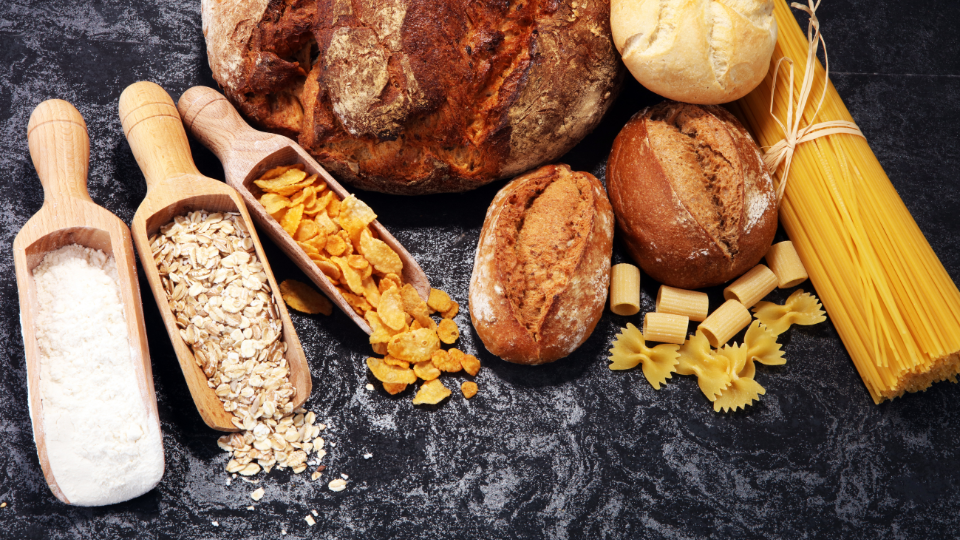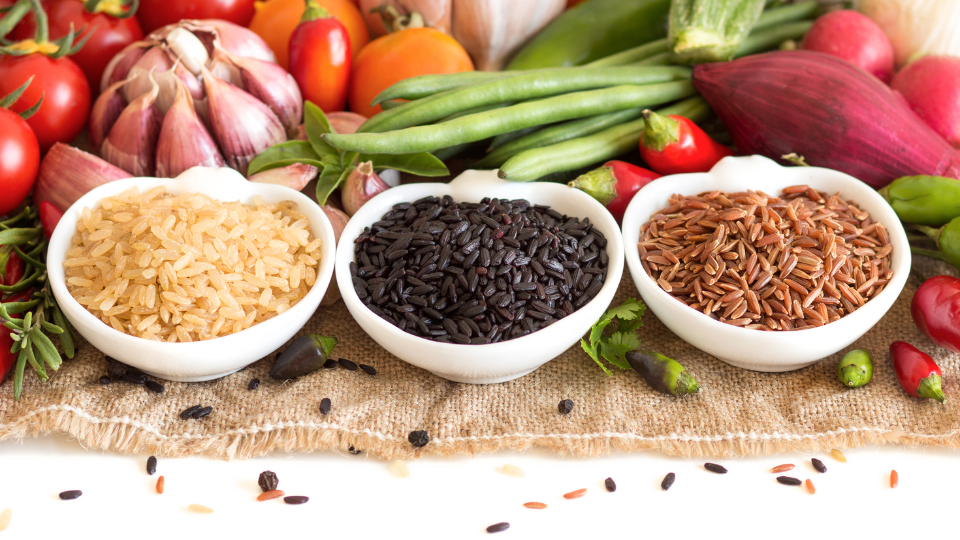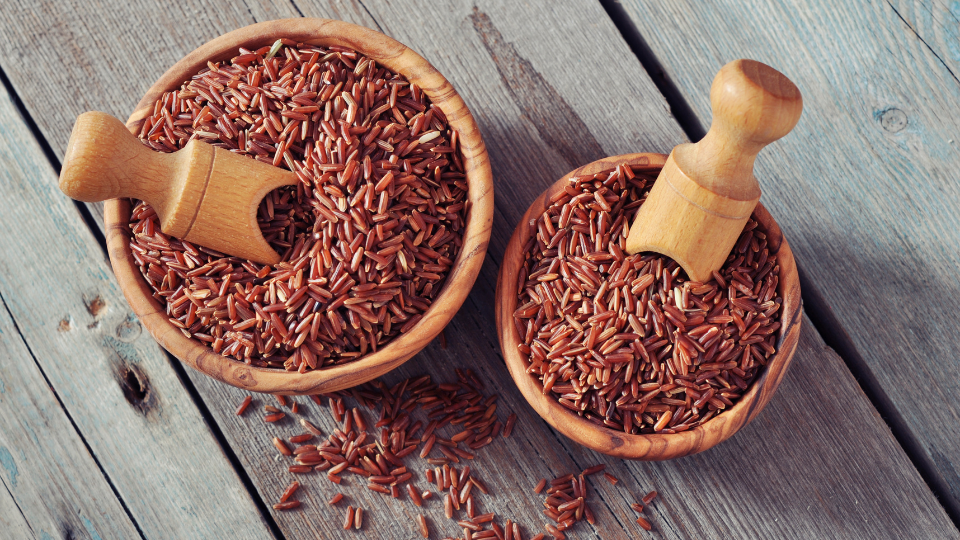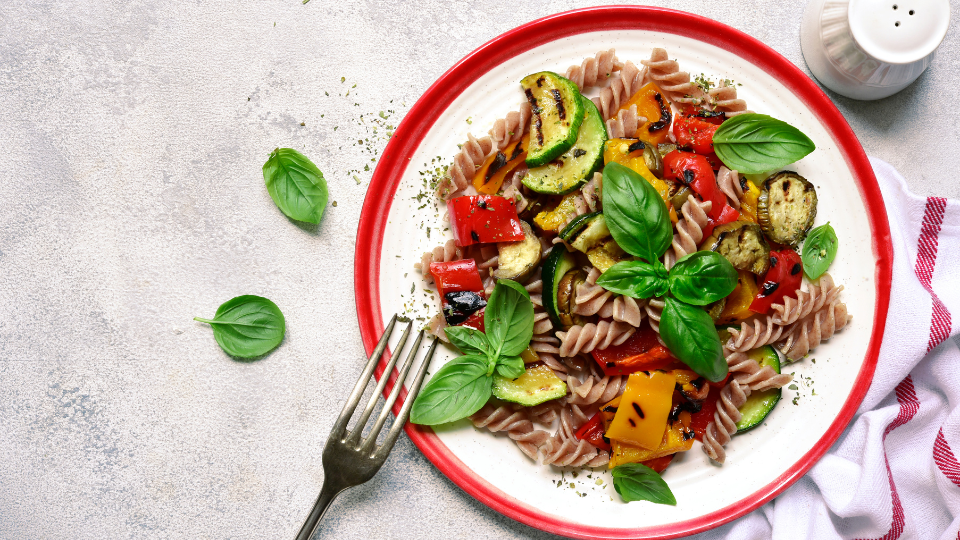Are you looking to improve your health and well-being? One simple way to achieve this is by incorporating whole grains into your diet. Whole grains are packed with essential nutrients, fiber, and antioxidants that can have a positive impact on your overall health.
In this article, we will explore various tips and strategies that will not only provide you with the knowledge and inspiration to make healthier choices but also help you feel like part of a community of individuals who prioritize their well-being.
Whether you're new to the world of whole grains or looking for fresh ideas, we've got you covered. From different types of whole grains to delicious recipes and specific diets, get ready to embark on a journey towards a healthier whole food plant-based lifestyle through the power of whole grains.
Key Takeaways
- Choose 100% whole grain options like unpolished rice and millets & whole wheat
- Start gradually substituting refined grains with whole grains while still enjoying the same dishes
- Experiment with different types of whole grains
- Get creative with recipes to incorporate whole grains into meals
Why Whole Grains?
If you're looking to improve your overall health and well-being, incorporating whole grains as a part of a well-balanced whole food plant-based diet is a smart choice.
- Whole grains are packed with essential nutrients like fiber, vitamins, and minerals that can help lower the risk of chronic diseases such as heart disease, diabetes, PCOS, obesity, hypertension, and even certain types of cancer.
- One of the key benefits of whole grains is their high fiber content. Fiber plays a crucial role in maintaining a healthy digestive system and preventing constipation.
- It also helps regulate blood sugar levels and promotes satiety, making you feel full for longer periods of time. By including whole grains in your diet, such as oatmeal or brown rice, you can increase your fiber intake and improve your overall digestive health.
- In addition to their fiber content, whole grains have been shown to reduce the risk of cardiovascular disease. Studies have found that people who consume more whole grains have a lower risk of developing heart disease compared to those who consume refined grains. This may be due to the fact that whole grains contain antioxidants and other beneficial compounds that help protect against inflammation and oxidative stress in the body.
- With their high nutrient content, particularly fiber, whole grains offer numerous benefits, such as reducing the risk of chronic diseases like heart disease and diabetes.
So go ahead and start including foods like unpolished rice, millets, quinoa, barley, or whole wheat bread in your meals for a healthier lifestyle.
Different Types of Whole Grains
When adding whole grains to your meals, try incorporating a variety of options such as different types of millets, red, brown and purple rice, quinoa, whole wheat, and oats. These different types of whole grains offer a range of flavors and textures that can make your meals more interesting and enjoyable.
Additionally, they provide various health benefits due to their high fiber content and essential nutrients.
It's easy to include wholegrains in your diet with such wide availability of grain breads, grain cereals, and grain pasta. Look for products labeled as "wholegrain" or "100% whole wheat" to ensure you are getting the maximum nutritional value.
Wholegrain foods are less processed compared to refined grains, which means they retain more vitamins, minerals, and fiber. By choosing wholegrain products over refined ones, you can improve your digestive health and reduce the risk of chronic diseases like heart disease and type 2 diabetes.
These grains are packed with nutrients like protein, fiber, antioxidants, and minerals. You can use them in salads or side dishes instead of traditional rice or pasta for a wholesome alternative that adds variety to your meals.
To make it easier to include wholegrains in your daily routine, here is a quick bullet list of ideas:
- Start your day with a bowl of oatmeal topped with fresh fruits.
- Swap white bread for wholegrain bread when making sandwiches.
- Use quinoa, millets or brown rice instead of regular rice.
- Experiment with different types of grain cereals like barley or buckwheat for breakfast porridge.
By incorporating these different types of whole grains as a part of a whole food plant-based diet through various meal options like grain breads, grain cereals, grain pasta, and ancient grains, you can enjoy a wide range of flavors and textures while reaping their numerous health benefits.
So, go ahead and start exploring the endless possibilities that Wholegrains offer to enhance your meals and improve your overall well-being.
Benefits of Whole Grains
Incorporating a variety of whole grains into your meals is like adding colorful and nutrient-rich jewels to your plate, enhancing both the taste and health benefits. Whole grains are an essential part of a healthy whole food plant-based diet, providing numerous benefits for your overall well-being.
- Not only are they packed with fiber, but they also contain a wealth of essential vitamins, minerals, and antioxidants that promote good health. By including whole grains in your diet, you can improve digestion, regulate blood sugar levels, lower the risk of chronic diseases such as heart disease and type 2 diabetes, and even aid in weight management.
- One of the key benefits of consuming whole grains is their high fiber content. Fiber plays a crucial role in maintaining proper digestive function by promoting regular bowel movements and preventing constipation.
- Additionally, it helps to keep you feeling fuller for longer periods of time, which can be beneficial if you're trying to manage your weight. Whole grains also provide essential nutrients such as B vitamins, iron, magnesium, and selenium that contribute to overall good health.
- Furthermore, incorporating whole grains into your diet has been shown to have a positive impact on heart health. The fiber found in whole grains helps to lower cholesterol levels by reducing the absorption of harmful LDL cholesterol from the bloodstream. This can help prevent the build-up of plaque in the arteries and reduce the risk of heart disease.
- Whole grains have also been linked to improved blood sugar control due to their slower digestion rate compared to refined grains. This makes them an excellent choice for individuals with diabetes or those looking to prevent its onset.
Including a variety of whole grains in your diet provides numerous benefits for your health and well-being. From aiding digestion and regulating blood sugar levels to lowering the risk of chronic diseases like heart disease and diabetes, wholegrains are truly nutritional powerhouses.
Whole Grain Foods
To reap the benefits of whole grain foods, start by adding them to your meals in creative and delicious ways. Whole grains are an essential part of a healthy diet as they provide a rich source of fiber, vitamins, minerals, and antioxidants.
Including whole grain foods in your meals can help lower the risk of heart disease, stroke, type 2 diabetes, and certain types of cancer. They also promote digestion and contribute to weight management. With so many benefits, making whole grains a regular part of a well-balanced whole food plant-based diet is crucial.
There are various whole grain foods that you can include in your meals. Some popular options include millet rice, whole wheat bread, brown rice, quinoa, oats, barley, whole wheat roti, and whole grain pasta.
Incorporating these whole grain foods into your diet is not only beneficial but also adds diversity to your meals. By choosing whole grains over refined grains like white bread, maida or white rice, you're ensuring that you're getting more nutrients and fiber in every bite.
So next time you plan your meals or go grocery shopping, remember to include these contextually relevant whole grain foods in order to improve the quality of your diet and enhance overall health.
Tips for Incorporating Whole Grains
One great way to maximize the health benefits of your meals is by adding a variety of whole grain foods. Including whole grains in your diet can provide numerous benefits, such as improved digestion, reduced risk of chronic diseases, and increased energy levels. Here are three tips for incorporating whole grains into your daily meals:
-
Choose whole grain options: When shopping for bread, pasta, rice, or cereal, opt for products labeled as "100% whole grain" or "whole wheat." These options contain all parts of the grain and are higher in fiber and nutrients compared to refined grains. Experiment with different types of whole grains like millets, quinoa, brown rice, barley, or bulgur to add variety to your meals.
-
Start small: If you're new to including whole grains in your diet, it's best to start gradually. Begin by substituting one refined grain product with a whole grain alternative each week. For example, replace white bread with whole wheat bread or switch from regular pasta to whole wheat pasta. As you become accustomed to the taste and texture of whole grains, you can incorporate them more frequently into your meals.
-
Get creative with recipes: Incorporating whole grains doesn't have to be boring! Explore new recipes that feature these nutritious ingredients. Try making a hearty salad with millets instead of white rice or a slice of maida bread, or prepare a flavorful stir-fry using brown rice instead of white rice. You can also experiment with baking using different types of flour, such as oat flour or buckwheat flour.
Additionally,at Sampoorna Ahara, we offer an extensive selection of whole grain products that are a must-try! These items are not only highly nutritious but also delightfully delicious.
By following these tips and incorporating more whole grains as a part of a wholesome whole food plant-based diet, you'll not only enhance the nutritional value of your meals but also enjoy delicious and satisfying dishes.
Remember to choose contextually relevant options based on your dietary preferences and consult your healthcare professional or book an appointment with Dr. Achyuthan Eswar if you have any specific dietary concerns or conditions related to including more whole grains in your diet section.
Whole Grains for Specific Diets
Did you know that whole grains can be a beneficial addition to various dietary plans, such as gluten-free, vegetarian, vegan diets? Incorporating whole grains into these specific diets can provide essential nutrients and fiber while adding variety to your meals.
- For those following a gluten-free diet, there are several options available. Brown rice is a delicious and versatile whole grain that can be used as a base for stir-fries, salads, or even as a side dish. Buckwheat is another great choice, which is actually not related to wheat at all and is naturally gluten-free. It can be used in dishes like pancakes, porridge or as a substitute for rice.
You could also check out the gluten-free wholesome grain products at Sampoorna Ahara, a perfect blend of nutrition and flavor. Don't miss out on the chance to savor these nutritious, delicious, and gluten-free options. - Vegetarians or vegans looking to include more whole grains in their respective diets have plenty of options too. Wholegrain bread made from ingredients like oats, barley, or quinoa can be a nutritious choice for sandwiches or toast. Additionally, incorporating wholegrain breakfast cereals into your morning routine can provide energy and keep you feeling full throughout the day. Look for options that are low in added sugars and high in fiber to maximize the benefits.
Another option is wholewheat pasta or wholemeal bread and pasta made from durum wheat flour. These choices offer higher levels of fiber compared to refined versions and pair well with various vegetarian-friendly sauces and toppings.
By including these nutrient-dense foods in your daily meals as a part of a wholesome whole food plant-based diet, you can ensure that you're getting the necessary nutrients while enjoying delicious and satisfying dishes that support your specific dietary needs.
Healthy Whole Grain Recipes
Explore a world of delicious and nutritious possibilities with healthy whole grain recipes that will elevate your meals and support your dietary goals. Adding whole grains as a part of a whole food plant-based diet is a smart choice as they are packed with essential nutrients and provide numerous health benefits.
Here are three mouthwatering recipes that make it easy to incorporate whole grains into your daily meals:
-
Whole Wheat Pasta Salad: Swap out regular pasta for whole wheat pasta to enjoy a fiber-rich meal that will keep you feeling satisfied for longer. Cook the pasta according to package instructions and toss it with colorful vegetables like cherry tomatoes, cucumbers, bell peppers, and olives. Drizzle some lemon juice, and add some nut butter or tofu and nut based cream cheese on top for added flavor. This recipe is not only quick and easy but also provides a good dose of protein, fiber, vitamins, and minerals.
-
Brown Rice Stir-Fry: Replace white rice with brown rice in your stir-fry dishes for a healthier alternative. Start by cooking brown rice according to package instructions. In a separate pan, stir-fry an assortment of vegetables, such as broccoli florets, carrots, snap peas, and mushrooms, with either any of the nut butters or vegetable broth. Add soy beans or tofu for protein if desired. Once the veggies are tender-crisp, mix in the cooked brown rice and season with spices like ginger or garlic powder for an extra kick.
-
Whole Grain Banana Bread: Enjoy a guilt-free treat by making banana bread using whole grain ingredients instead of refined flour. Mash ripe bananas in a bowl and mix them with flax seed egg, date syrup, vanilla extract, almond butter, and cinnamon for flavor. In another bowl, combine wholemeal flour or oats with a dash of miso paste before adding this dry mixture to the wet banana mixture gradually until well combined. Pour the batter into a greased loaf pan and bake at 350°F (175°C) for about 50-60 minutes. The result is moist and delicious banana bread that incorporates the goodness of whole grains.
- Whole Food Plant-Based Red Rice: Soak raw red rice in water overnight, or at least for 6 hours. If you don't have time to soak this, don't worry, just skip to the next step and increase cooking time by five minutes. Boil red rice with double the quantity of water. Keep the lid half closed. Check from time to time. If water spills over, open lid some more for a few minutes, until some water evaporates. If rice is getting burnt from lack of water, add more water. Once rice is nearly fully cooked, remove from stove and keep closed. Once it has cooled down completely, serve fresh with chettinad paruppu urundai kuzhambu
So get creative in the kitchen and start incorporating these wholesome ingredients into your favorite dishes today!
Frequently Asked Questions
Are whole grains suitable for people with gluten intolerance or Celiac disease?
Yes, whole grains can be suitable for people with gluten intolerance or celiac disease. Whole wheat, barley, and rye contain gluten, there are plenty of gluten-free whole grains like quinoa and brown rice that you can enjoy.
Can whole grains help with weight loss?
Yes, whole grains can help with weight loss. They contain more fiber, which keeps you full longer and helps control your appetite. Replace refined grains with whole grains like brown rice, quinoa, and whole wheat bread to support your weight loss goals.
How can I ensure I'm getting enough fiber from whole grains?
To ensure you're getting enough fiber from whole grains, aim to include them in your meals and snacks throughout the day. Choose whole grain versions of breads, cereals, rice, and pasta. Additionally, check out the extensive selection of whole grain products from Sampoorna Ahara.
Can whole grains help lower cholesterol levels?
Yes, whole grains can help lower cholesterol levels! They contain soluble fiber which binds to cholesterol and removes it from your body. By including whole grains as a part of a well-balanced whole food plant-based your diet, you can improve heart health and reduce cholesterol levels.
Are there any potential side effects or risks associated with consuming whole grains?
Consuming whole grains is generally safe and beneficial for your health. However, some individuals may experience digestive issues like bloating or gas. It's important to introduce whole grains gradually and drink plenty of water to minimize any potential side effects.
Conclusion
In conclusion, incorporating whole grains into your diet is like adding a burst of sunshine to your meals. These tiny powerhouses are packed with fiber, vitamins, and minerals that nourish your body from the inside out.
By choosing whole grain options like brown rice, quinoa, and whole wheat bread, you're giving yourself the gift of better digestion and improved heart health.
But why stop there? Whole grains can be as versatile as they are nutritious. From hearty breakfast bowls to comforting dinner dishes, there's a world of possibilities waiting for you to explore. So don't be afraid to get creative in the kitchen and experiment with different flavors and textures.
Remember, making small changes can lead to big results. Start by swapping out refined grains for their whole grain counterparts in your favorite recipes. Before you know it, you'll be reaping the rewards of increased energy levels and a stronger immune system.
So next time you're at the grocery store or planning your meals, make sure to fill your cart with an assortment of whole grain goodies that will delight both your body and soul.
Remember: eating well doesn't have to mean sacrificing flavor or satisfaction. Adding whole grains as a part of a whole food plant-based diet, every meal can be a delicious adventure that fuels both your body and mind.
So let's toast to good health and happy eating with one spoonful of wholesome goodness at a time!
Next Steps
Congratulations! Now you know the benefits of whole grains and the ways to incorporate whole grains as a part of a whole food plant-based diet.
Looking to eat healthy? We can help. Here are some additional tools to help your smooth transition to a whole food plant-based diet:
- Book an online consultation with Dr. Achyuthan Eswar for a personalized medical consultation to prevent, treat and better manage lifestyle diseases through diet and lifestyle.
- Learn to cook delicious whole food plant based goodies and sign up for courses on health and wellness from the comfort of you home. Join our online courses from anywhere in the world.
- Get daily essentials to cook healthy meals at home.
- Stock up on delicious sweets and snacks that are sugar/jaggery-free, oil-free, maida-free and plant-based - Available Pan-India.








